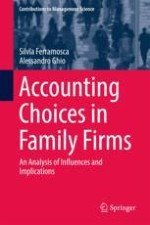2018 | OriginalPaper | Buchkapitel
4. Accounting Conservatism in Family Firms
verfasst von : Silvia Ferramosca, Alessandro Ghio
Erschienen in: Accounting Choices in Family Firms
Aktivieren Sie unsere intelligente Suche, um passende Fachinhalte oder Patente zu finden.
Wählen Sie Textabschnitte aus um mit Künstlicher Intelligenz passenden Patente zu finden. powered by
Markieren Sie Textabschnitte, um KI-gestützt weitere passende Inhalte zu finden. powered by
